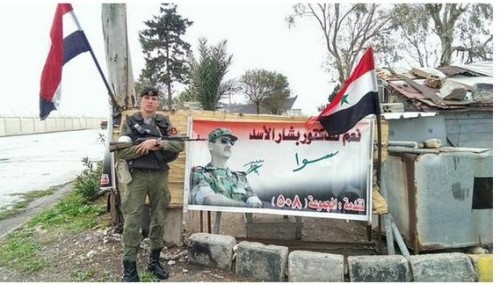PHOTO: A Russian soldier in Tartous in western Syria, undated
Are the Russians coming?
The mainstream media, looking for dramatic headlines over-hyped the Russian military presence in Syria earlier in the week. They said incorrectly that Moscow had begun putting its forces on the ground alongside Assad’s troops and its warplanes in the sky.
See Syria Analysis: Rumors of Russia’s Military Involvement Miss A Bigger Political Story
Yesterday they tried again, propped up by satellite and other information fed by US officials to journalists. The Los Angeles Times opened:
Reconnaissance photos of possible military housing being built near the international airport in Latakia province provides strong evidence of deepening involvement by President Vladimir Putin’s government in the four-year-old Syrian war.
In addition, the Russians have asked at least one country bordering Syria for a window of time to fly a detachment of warplanes over its territory and into Syria, the officials said. The officials would not name the country, but Turkey lies between Russia and Syria.
That summary was fair enough, but the Times immediately made leaps beyond it. The housing in western Syria on the Mediterranean was “an apparent Russian base for staging troops” — rather than, say, for the existing forces and advisors at Russia’s naval facilities in Jableh and Tartous.
Nor did the Times ask obvious questions. Given that Turkey is a firm supporter of the Syrian opposition and rebels, why would Ankara ever grant permission for Moscow to begin direct involvement on the battlefield?
But even if these concerns were expressed — and they were not — they would have been swept away by the media rush through the day. The Daily Beast, which proclaimed in mid-week that “Russia Puts Boots on the Ground in Syria”, charged once more on Saturday: “Exposing Russia’s Secret Army in Syria“.
Michael Weiss, a fierce opponent of both the Assad regime and the Russians, created the “secret army” from exaggeration both of evidence and of its significance. He opened:
Russian military officers are now in Damascus and meeting regularly with Iranian and Syrian counterparts, according to a source with close contacts in the Bashar al-Assad regime….
“They’re out in restaurants and cafes with other high officials in the Syrian Army,” the source [said]….“The Russians aren’t in uniform, but they’re constantly hanging out with officers from the Syrian Army’s central command.”
That sounds dramatic, except that Russian military officers — who were based in Damascus before the start of the uprising in March 2011 — have been meeting Syrian and Iranian counterparts regularly throughout the conflict. That is because they have been significant in providing advice and logistics for the Assad regime, from the strategy against the rebels to battlefield operations to propaganda. Those conversations have probably been stepped up recently amid the rebel advance in much of Syria, with the Russians and Iranians considering a defense line from Latakia Province to Homs to Damascus.
The article tries again with “other Syrians claim to have seen Russians in uniform”, which turns out to be a single report of two soldiers who “were tall, blonde, and blue-eyed”. Then it lifts from oppositions outlets who have claimed “a noticeable deployment of Iranian and Russian elements” in Damascus neighborhoods and even a hotel “turned into a military barracks for the Iranians”.
The solid evidence of increased Russian involvement remains, as was the case earlier this week, the sighting of advanced equipment — including infantry fighting vehicles — on the way to Syria and even, in one case, on the battlefield in Latakia Province. The construction of new facilities in Latakia is also likely, although it is unclear where this is an extension of the Russian naval bases or a platform for ground forces.
Beyond that, all is speculation at this point. While Russian President Vladimir Putin is far from a trustworthy sources, his words on Thursday are probably a better guide to the situation:
To say we’re ready to do this today — so far it’s premature to talk about this. But we are already giving Syria quite serious help with equipment and training soldiers, with our weapons.
Moscow may indeed fulfill the hopes and fears of the media with a full stake in the Syrian civil war. However, it would not do so without significant risk. As analyst Yury Barmin interjected on Saturday:
Let me make something clear, Russian specialists have always been in Syria. Russia has been continuously sending hardware to Syria
— Yury Barmin (@yurybarmin) September 5, 2015
Yet Russian troops have never taken part in action, because any Russian KIA in Syria would be huge PR for ISIS
— Yury Barmin (@yurybarmin) September 5, 2015
That is enough to proceed with some caution through the battlefield of “news” about Russia and the Assad regime.

